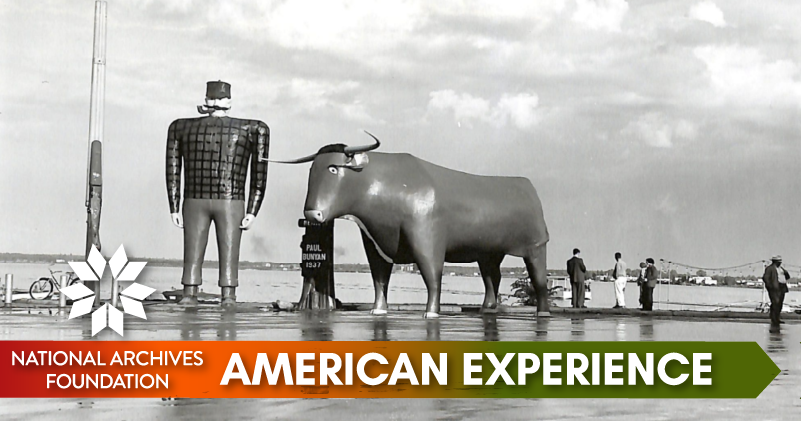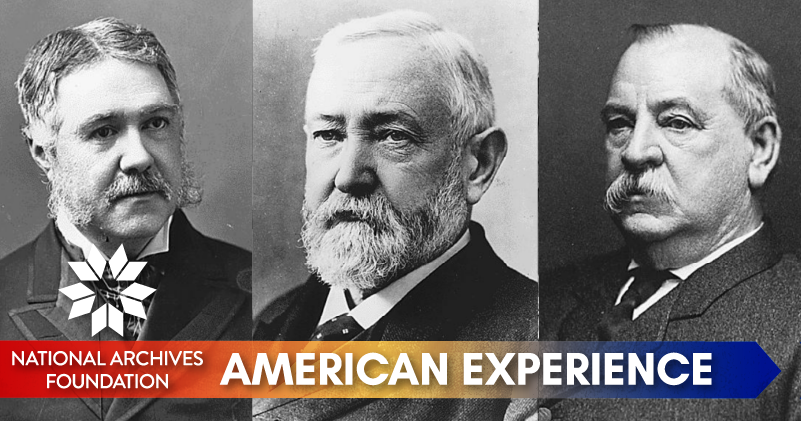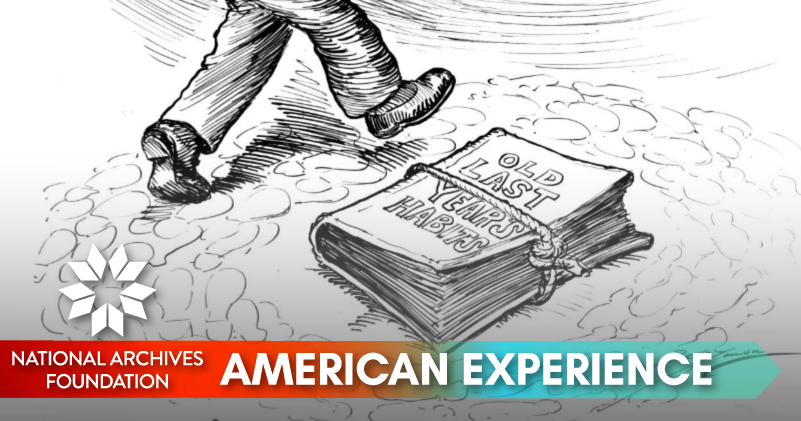🔥Torch of Competition🔥
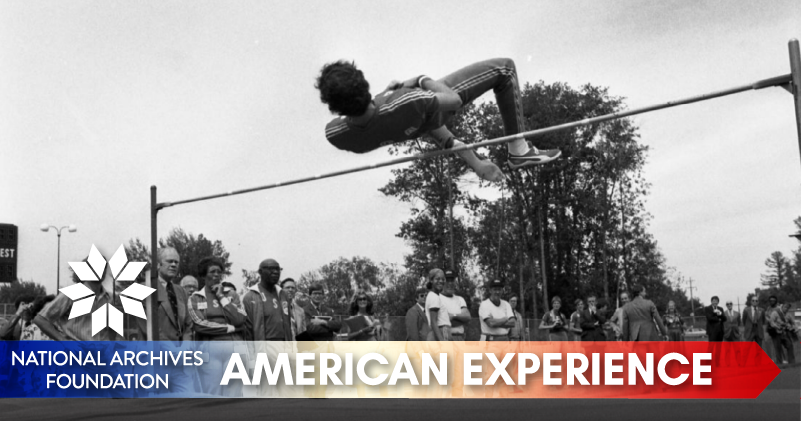
Thorpe. Owens. Smith. Carlos. Ali. Jenner. Lewis. Griffith-Joyner. Retton. Luganis. Phelps. These names need no introduction or context. They are a few of the iconic names that stand above others in Olympic history.
Around the globe, nothing brings out a country’s patriotism like the biennial international competition. (Except maybe the World Cup in soccer.) Even for folks who aren’t really “into sports,” it is hard not to cheer for the underdog or scream as a world record is broken. In the U.S., we have no shortage of Olympic zeal when it comes to our athletes.
Over the years, the United States has hosted the games eight times. Presidents and first families have attended opening and closing ceremonies and have received many Olympic gifts. Olympians have visited the White House after rousing success. And the National Archives has the photos, records, speeches, and torches to prove it. To jump into the spirit, we share some of memories from our holdings with you this week. Let the games begin!
🥇


Patrick Madden
Executive Director
National Archives Foundation
The American Games
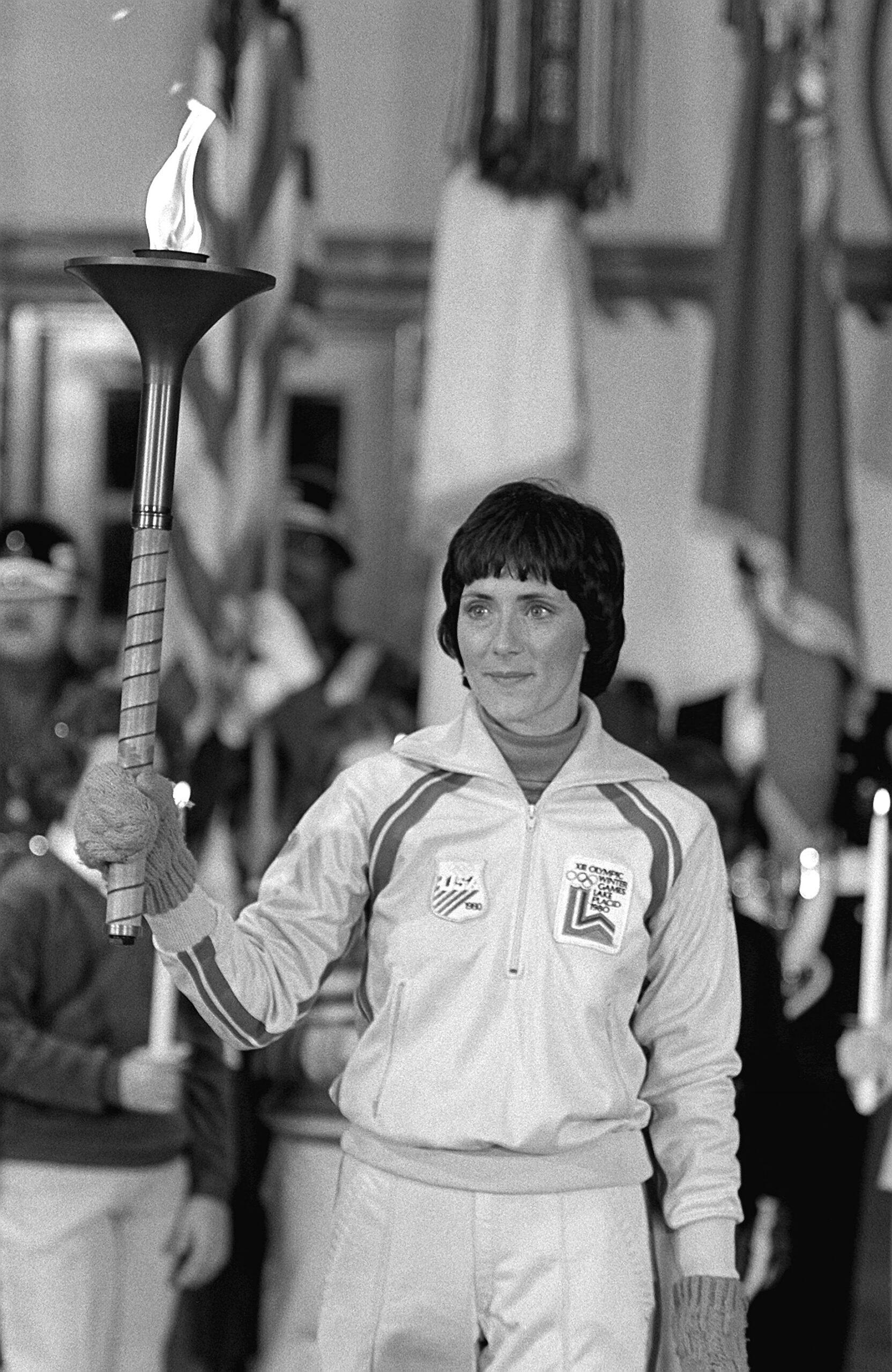

The Olympic games are an international endeavor, and in keeping with that spirit, they are held in different cities around the world every four years. The modern Olympic games were first held in Athens, Greece, in 1896. Since then, the games have been held in the United States eight times, more than in any other nation.
In the beginning, the Olympic games included only summer sports. It was not until 1924 that the winter Olympic games were added. The summer games that have been held in the U.S. are the third summer games in St. Louis, Missouri, in 1904; the tenth summer games in Los Angeles, California, in 1932; the twenty-third summer games in Los Angeles, in 1984; and the twenty-sixth summer games in Atlanta, Georgia, in 1996. The winter Olympics that have been held in the U.S. are the third winter games in Lake Placid, New York, in 1932; the eighth winter games in Squaw Valley, California, in 1960; the thirteenth winter games in Lake Placid, in 1980; and the nineteenth winter games in Salt Lake City, Utah, in 2002.
Two U.S. cities, Los Angeles, California, and Lake Placid, New York, have hosted the games twice. Los Angeles is scheduled to host the summer games a third time in 2028.
Winter Olympics 1960, Tahoe National Forest
(24 minutes 7 seconds)
Source: NARA YouTube Channel
All in the Family


Source: NARA’s Pieces of History blog
American athletes of color have long faced systemic racism that has interfered with their success. Jesse Owens, a Black track and field athlete on the 1936 U.S. Olympic team, thoroughly embarrassed Adolf Hitler when he beat the German contenders and won four gold medals in Berlin. When he returned home, however, Owens and the other Black Olympic athletes were not invited to the White House, while their white teammates were. Furthermore, Owens struggled to make a living, eventually having to file for bankruptcy.
in ESPN LIVE
A Conversation with the President
Sports and Race: Running in place?
Source: Clinton Library
A family of Black athletes who you may have heard less about is the Joyners, who have devoted themselves to serving their communities since they stopped competing. Born in East St. Louis in 1960, Alfrederick “Al” Joyner won the gold medal in the triple jump at the 1984 Olympic games in L.A. Al’s sister, Jackie Joyner-Kersee, who also hails from East St. Louis, medaled in the long jump and the heptathlon in four different Olympic games, accumulating three gold, one silver, and one bronze award.
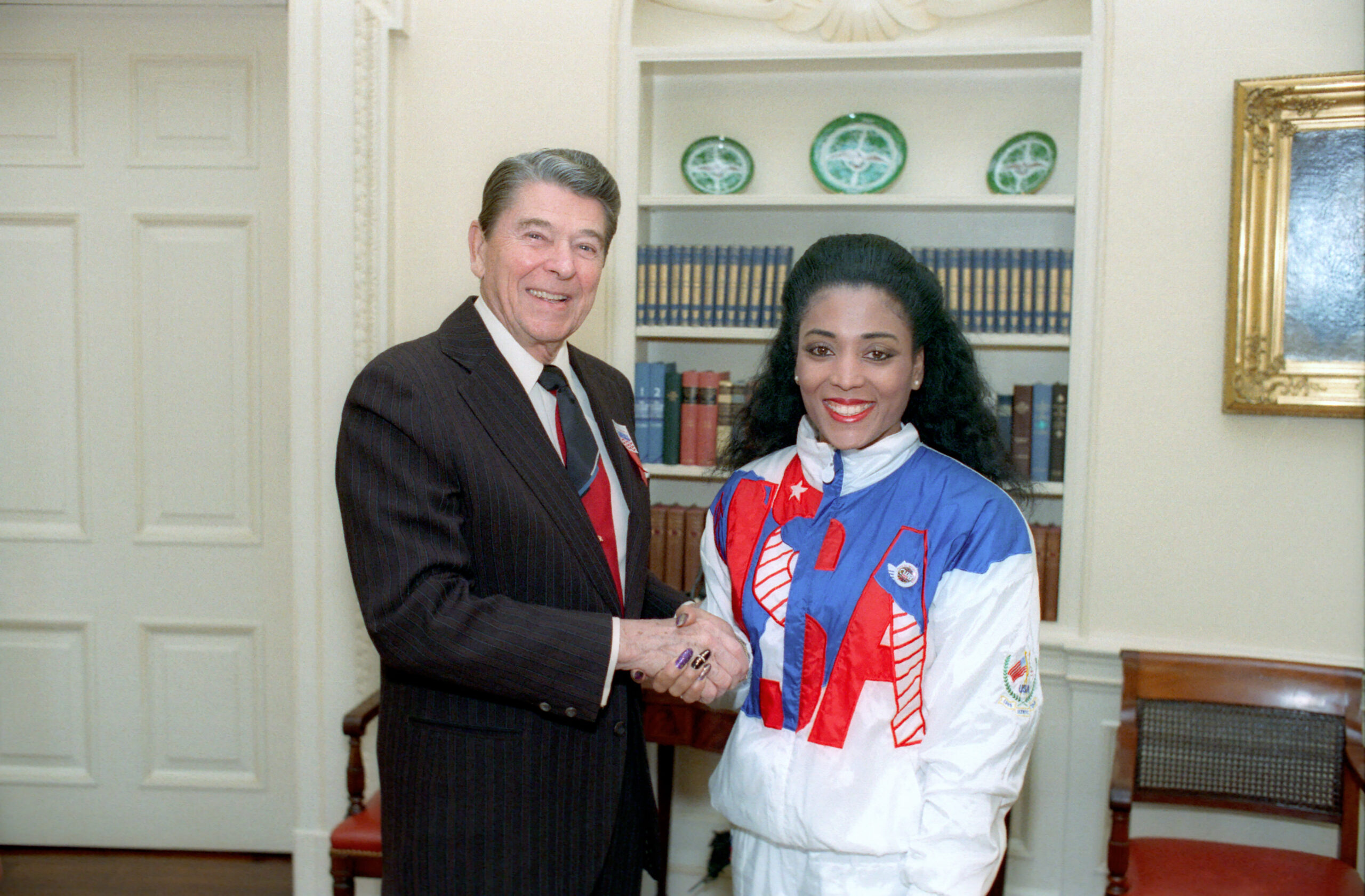

Al Joyner married and then coached Florence Griffith Joyner, a sprinter from California nicknamed “Flo-Jo,” who became the fastest woman of all time. Known for her colorful outfits and fun nail art, Flo-Jo won a silver medal at the 1984 games in Los Angeles, and three gold and one silver medal at the 1988 games in Seoul, South Korea. Tragically, Florence Griffith Joyner died in her sleep at the age of 38.
After Flo-Jo passed, Al Joyner spearheaded the efforts of the Flo-Jo Memorial Community Empowerment Foundation, which aims to help young people around the world pursue their dreams. Al Joyner continues to coach track and field athletes.
President Names Joyner and McMillen to Head Council on Physical Fitness
Source: Clinton Library
After she retired from track and field competition, Jackie Joyner-Kersee returned to East St. Louis, where she established the Jackie Joyner-Kersee Foundation. The Foundation partners with Comcast, the Christian Activity Center, and Intel to create after-school programs and provide laptops, internet connections, and computer clubhouses for low-income families. She was a founding member of Athletes for Hope, and she has served on the President’s Council for Physical Fitness.
Playing Politics
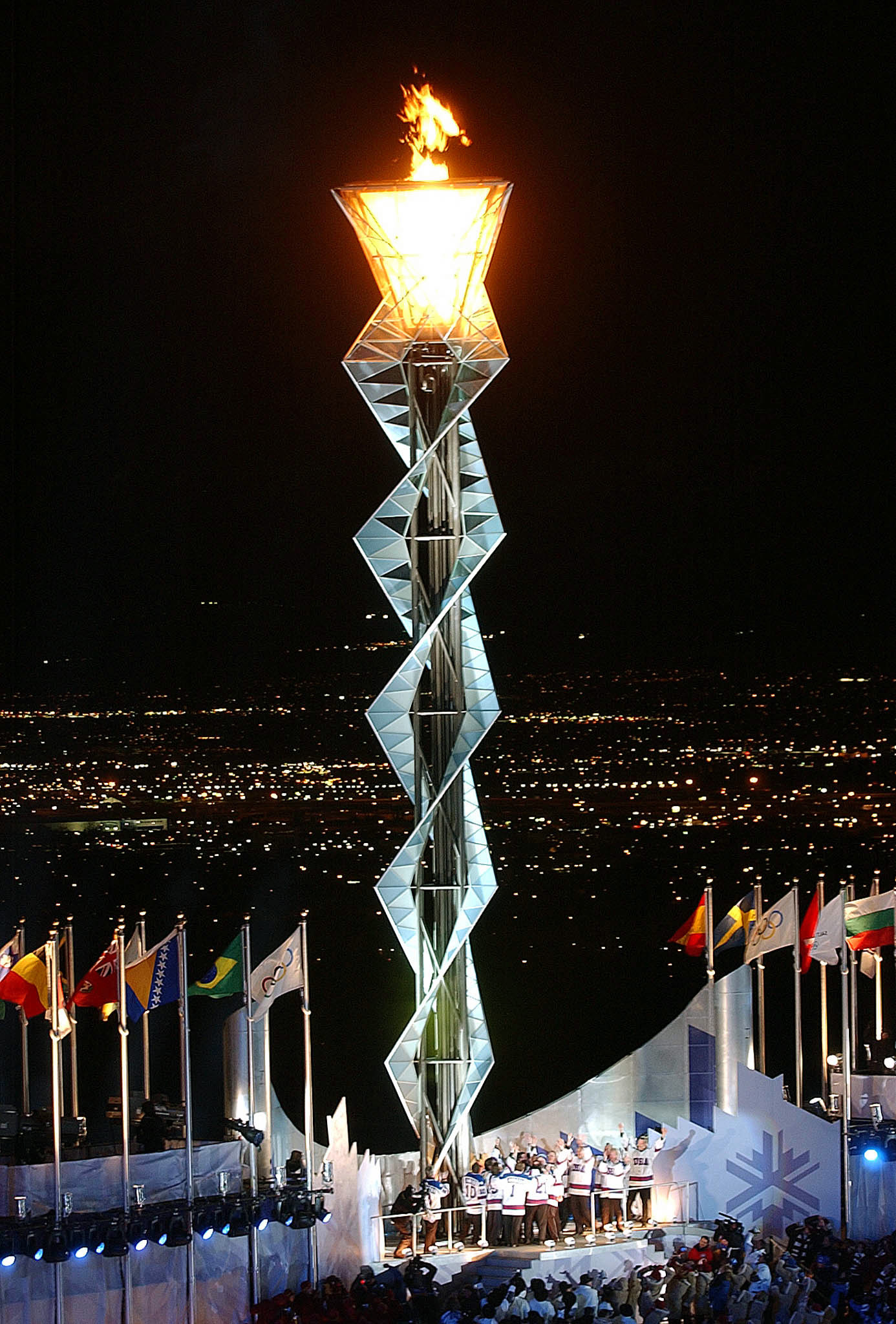

Ideally, the Olympic games would be a politics-free zone where athletes can compete strictly on their own merits. In reality, of course, it’s not at all uncommon for politics to pervade the games.
One example of the presence of politics in the games is the “Miracle on Ice,” the 1980 U.S. men’s ice hockey team’s victory over the Soviet Union’s team in the penultimate match of the winter games in Lake Placid, New York. “That game was and is to me the greatest upset in the history of sport, any sport, any place, any time,” broadcaster Jim McKay said at the opening ceremonies of the Salt Lake Winter Olympics in 2002. The 1980 men’s team went on to defeat Finland in the final game and claim the gold medal. The “Miracle on Ice” is one of the best-known stories in sports of all time.
What has become rather obscured, however, are the reasons the U.S. win was considered so significant at the time. The long-running Cold War contributed to the animosity between the two nations, but also, the Soviet Union had invaded Afghanistan in 1979 to virtually universal and worldwide condemnation. The victory of the U.S. team, comprised almost entirely of amateur athletes, over the Soviet team, which was mostly made up of professional hockey players, was seen as a triumph of American righteousness over Russian aggression.
That summer, President Jimmy Carter announced that the United States was boycotting the Olympic games in Moscow because of the Soviet Union’s invasion of Afghanistan. In retaliation, the Soviet Union boycotted the summer games in Los Angeles, citing security issues and anti-Soviet sentiment in the United States.
Source: Reagan Library
Other nations have boycotted the Olympics—for instance, many African nations did not participate in the 1976 Olympics in Montreal because New Zealand was competing there. Earlier that year, the New Zealand rugby team had toured South Africa, which at the time was subject to a sports embargo because of its apartheid social systems. Nevertheless, athletes from New Zealand were still allowed to compete in Montreal, which sparked the boycott. But many historians contend that neither the 1980 nor the 1984 boycott had any discernible effect on the political point the boycotting nations were trying to make. They did, however, derail the careers of many athletes who had been training all their lives to compete in the Olympics and disenchanted many members of the public as well.

…and 268 Days Old


National Archives Identifier: 16801973
You might think that Olympic competitors can state their ages in conventional terms—for instance, “fifteen and a half” or “going on sixteen.” But when athletes are competing in the Olympics, their ages are calculated down to the day. Marjorie Gestring was the youngest American to win a gold medal in the Olympics, beating her teammate and odds-on favorite Katherine Rawls in the three-meter springboard diving competition at the 1936 summer Olympics in Berlin. Those back home in the U. S. could have read about her victory and others in the Civilian Conservation Corps Newspaper, Happy Days. Gestring was thirteen years and 268 days old when she won her medal—almost fourteen by most standards, but that metric is not quite fine-grained enough for the Olympic games.
Volume IV, Issue 11: July 25, 1936
National Archives Identifier: 208138817
The Final Light


Source: The Reagan Library Education blog
At every Olympic games since 1936, a flame ignited in Olympia, Greece, has been carried to the site of the games via a torch relay. Once it reaches the host nation, the torch is carried through towns large and small. In 1984, President Ronald Reagan welcomed the torch bearer to the White House.
In the final leg of the relay, the flame is borne to the Olympic cauldron by a person of great significance—usually an elite athlete, but sometimes a non-athlete who has notably contributed to society. The identity of the final torch bearer is always a closely guarded secret.


National Archives Identifier: 6527810
At the Olympic games that have been held in the United States, the torch bearers on the final leg have included all sorts of people. At the 1960 winter Olympics in Squaw Valley, California, Ken Henry, a gold medalist in the 500-meter speed skating event at the 1952 winter Olympics in Oslo, Norway, lit the cauldron. In 1980, at the Lake Placid, New York, winter games, the final leg was run by Charles Kerr, a psychiatrist who was chosen from among all fifty-two of the torch-relay runners. At the Los Angeles summer games in 1984, Rafer Johnson, the decathlon gold medalist in the 1960 summer games in Rome, Italy, ran the last leg of the relay. In 1996, at the summer games in Atlanta, Georgia, Muhammad Ali, who won a gold medal in the light heavyweight division of the boxing competition in 1960, ignited the cauldron.* And at the Salt Lake City winter games in 2002, the 1980 U.S. men’s hockey team, the winners of the Miracle on Ice game, converged on the podium to light the flame together.
Source: NARA’s Prologue magazine
Among the holdings of the National Archives is the USIA Motion Picture Collection and African American History, which includes important films such as The Rafer Johnson Story and the Television Satellite series that documented the lives and work of many Black athletes, artists, and military figures, including Muhammad Ali and General Colin Powell.
*By the way, yesterday, July 19th, was the 25th anniversary of Muhammad Ali lighting the torch at the ‘96 games. Documentarian and Foundation Board member, Ken Burns, has a new documentary about Ali that highlights this electric moment in Olympic Games’ history.





